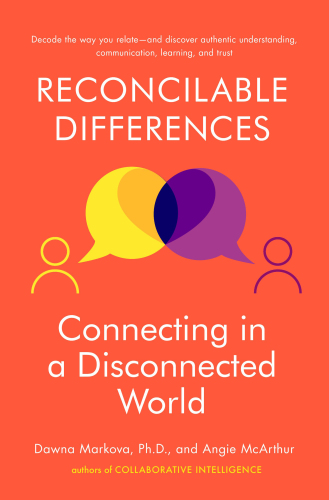
Reconcilable Differences
Connecting in a Disconnected World
کتاب های مرتبط
- اطلاعات
- نقد و بررسی
- دیدگاه کاربران
نقد و بررسی

June 19, 2017
Markova and McArthur (coauthors of Collaborative Intelligence: Thinking with People Who Think Differently), a mother-and-daughter-in-law team of communication consultants, offer readers a thoughtful but impractically elaborate system for improving interpersonal communications. The system is based on three factors: visual (V), auditory (A), and kinesthetic (K). These factors are translated into six communication styles: VAK, VKA, KAV, KVA, AVK, and AKV. The book is divided into four parts concerned with “mind patterns,” “thinking talents,” “inquiry styles,” and “personal narratives.” Along the way, Markova and McArthur point out how apparently “irreconcilable” differences can be caused by “inattention, misunderstanding, and uncertainty.” The book includes multiple charts to illustrate how people who use different styles communicate with each other. This system may offer new insights and tips for people who are highly motivated to work through the classifications and analyses together, a process that might in itself strengthen their relationships with each other. What’s not included is how this system might improve communication with people who have no desire to apply its principles or dislike being placed into labeled boxes. By the end of this book, Markova and McArthur’s expertise in their field has been made clear, but it’s less clear that their methods hold real value for laypeople.

Starred review from November 1, 2017
Positive relationships blossom when we discover common connections with one another. As relationships develop, differences become exposed and communication may become strained. Numerous books have offered techniques for managing communication difficulties, yet they persist. Markova and McArthur, who previously collaborated on Collaborative Intelligence, maintain that once we label individuals as "difficult," we no longer effectively relate to them. Instead of growing closer in our communication, we try to fix or work around "difficult" people. The authors contend that such behaviors are rooted in differences in how people communicate, learn, and trust. This book focuses on understanding communication styles: auditory, kinetic, or visual. Only by accepting these various styles and committing to growing with the other person can relationships fully develop. This book is an easy, not breezy, read with straightforward language and packed with excellent analogies, examples, and quizzes. VERDICT To get the most out of this work, readers will want to study and implement the ideas presented. Patrons searching for better ways of building connections, and fans of the author's previous works, as well as those of Deborah Tannen and Gary Chapman, will appreciate this offering.--Lydia Olszak, Bosler Memorial Lib., Carlisle, PA
Copyright 2017 Library Journal, LLC Used with permission.

November 1, 2017
Positive relationships blossom when we discover common connections with one another. As relationships develop, differences become exposed and communication may become strained. Numerous books have offered techniques for managing communication difficulties, yet they persist. Markova and McArthur, who previously collaborated on Collaborative Intelligence, maintain that once we label individuals as "difficult," we no longer effectively relate to them. Instead of growing closer in our communication, we try to fix or work around "difficult" people. The authors contend that such behaviors are rooted in differences in how people communicate, learn, and trust. This book focuses on understanding communication styles: auditory, kinetic, or visual. Only by accepting these various styles and committing to growing with the other person can relationships fully develop. This book is an easy, not breezy, read with straightforward language and packed with excellent analogies, examples, and quizzes. VERDICT To get the most out of this work, readers will want to study and implement the ideas presented. Patrons searching for better ways of building connections, and fans of the author's previous works, as well as those of Deborah Tannen and Gary Chapman, will appreciate this offering.--Lydia Olszak, Bosler Memorial Lib., Carlisle, PA
Copyright 2017 Library Journal, LLC Used with permission.

























دیدگاه کاربران